Mexican journalists are still being failed
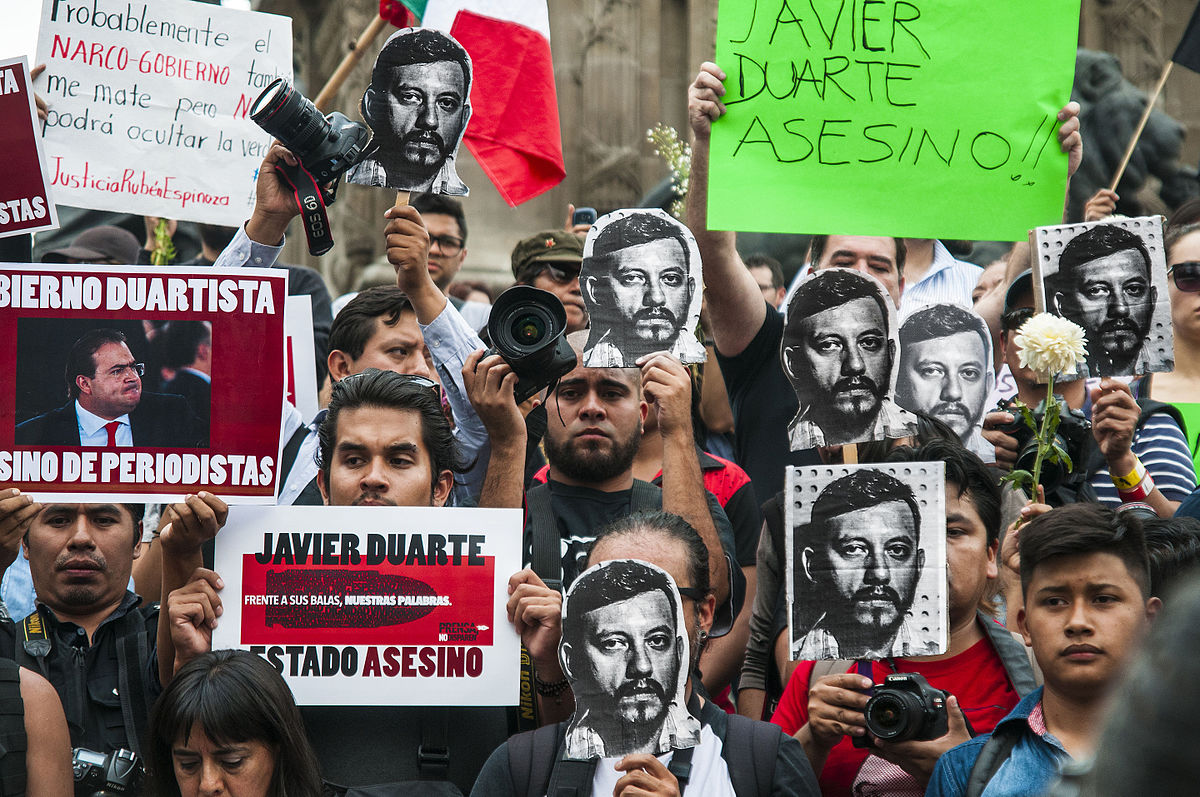
People march in the streets of Mexico to protest the death of journalist and photographer Rubén Espinosa, killed in Mexico City in 2015. Photo: Eneasmx/wikimedia commons
Mexico has long been a ruthless place for journalists and press freedom. According to the international human rights organisation Article 19, 156 journalists have been murdered in Mexico since 2000. Of the total, 144 were men and 12 were women. In April 2017, the journalist Duncan Tucker revealed in Index on Censorship magazine that it was really common for the newsrooms of local media to have drug cartel spies and informants infiltrated as staff members. Threats from corrupt government officials were also a daily problem for the Mexican press.
“Without a drastic change, Mexico and its journalists will face an even bleaker future,” Tucker wrote. Sadly, five years on this drastic change has not arrived in Mexico. Eleven journalists have lost their lives so far this year in the country due to their work. The most recent example is Juan Arjón López, who was killed with a blow to his head in the state of Sonora, in August.
One of the most dangerous regions for journalists in Mexico is the state of Veracruz: between December 2010 and November 2016, when Javier Duarte was governor of the state, 18 journalists were killed. A well-known case was the death of Regina Martínez Pérez, a journalist who investigated corruption in Veracruz and its connection with drug cartels. Her body was found in her flat on 28 April 2012, strangled to death. Four years later, Duarte resigned as governor following a series of corruption scandals, which led to a nine-year sentence in jail.
To understand more about this situation, Index talked to Mexican journalist Témoris Grecko, who currently lives in Mexico City and is a columnist for Aristegui Notícias, and a contributor to other media including Milenio Daily, La Octava TV and Rompeciento TV. In 2020 Grecko’s book, Killing the Story: Journalists risking their lives to uncover the truth in Mexico, was published.
Drug cartels seem to be a massive threat across Mexico. What is the relationship between them and the government or public officials?
The first thing I’d like to point out is that there is a bit of a myth regarding narco-trafficking in Mexico. Of course, it exists and there are many criminal gangs, but it’s not to be blamed for everything and that’s what happens. If a woman is killed or a journalist is killed, or something terrible happens, you can’t only blame the narco-trafficking and that’s it. And the narcos serve to mask many other activities. Many of the gangs are secondarily dedicated to narco-trafficking. Maybe they are in different kinds of smuggling, or they are doing illegal logging. Narcos are believed to be opposed to the government, but the real international mafias are in many governments, criminal gangs are usually related to people who work in the government, either in the Mexican government or the American. And in this way, the narcos need to be blamed for what happens to journalists of course, but organisations that are working with freedom of speech, such as Reporters Without Borders (RSF) and the Committee to Protect Journalists (CPJ), have collected data that shows that most aggressions are coming from official figures, maybe from politicians, political parties, police, the army or other authorities.
What kind of story can be the most dangerous one for journalists to work on?
There is crime-related journalism. But also, journalists who are exposing activities from mega companies. Maybe mining or logging companies or companies who are doing labour exploitation, and of course activities of politicians. For instance, we suspect Rubén Espinosa [who worked for the investigative magazine Proseco], a photographer murdered in 2015 in Mexico City, was killed by people linked to the then governor of the state of Veracruz, Javier Duarte. And this is because he felt very uncomfortable with some of the pictures that Rubén had published, that didn’t show Duarte in the life he wanted to be seen [the best example is a photo that Espinosa took for the left-wing news magazine Proceso, which showed Duarte’s white shirt with his name embroidered on it and a police cap written “Governor”]. And there have been journalists obviously murdered by criminal gangs, such as Javier Valdez [who became known for covering drug cartels], killed in 2017 in the state of Sinaloa.
Is there a particular region in Mexico that you consider the most dangerous for journalists?
By far the state of Veracruz. Two-thirds of the killings have happened there since 2010 and then there are other very dangerous states, such as Sinaloa, Guajaca and Tamaulipas. But sometimes it is not only about killings, but other types of aggression. For instance, maybe in the state of Tamaulipas they don’t kill so many journalists, but they are regularly beaten up or threatened. Persecuted somehow. Tamaulipas is the best example of what we call a silence zone. A place where politicians and criminal gangs control the news. They have people that we call ‘enlaces’, who work as press officers for these powerful people. And they are in touch with the journalists to tell them what can be published and what cannot. And also they suggest, which is actually an imposition, some news or photographs that they want to see published.
Have you ever been threatened due to your work as a journalist in Mexico City?
Not in Mexico. While working in the Middle East, Africa and Asia, yes [Grecko has covered conflicts in places like Libya, Egypt, Iran, Syria, Palestine, Congo and The Phillippines], but not in Mexico.
How do you manage to keep yourself safe in this ruthless environment?
First of all, there is a massive difference between living in the capital and other states. With my team and my crew, when we go to work in risky states, we have security protocols which include making sure our sources are safe, using secure communication channels, and studying entry and exit ways. We monitor each other. We try to spend the least possible time there. We don’t really tell anyone what we are doing. We are also very careful in trying to keep our sources safe. And in my case, as a more public person, exposure should be a bit of a shield to protect, even if it’s never enough.
What do you believe could be done to overcome this situation and make Mexico a safer place for journalists?
There are different initiatives. For twelve years we’ve had a mechanism for the protection of human rights defenders and journalists [called The Special Prosecutor For Attention to Crimes Committed against Freedom of Expression, or Feadle in Spanish, it was created in 2010 to tackle the increase in attacks, particularly murders, against journalists and its measures have included panic buttons for threatened journalists, installed security cameras at their homes and bodyguards in extreme situations]. This has saved some lives and protected some people, but also has had very resounding failures. Also, the problem with this mechanism is that it shouldn’t exist. It is needed due to Mexican justice’s failure to take the aggressors of journalists to accountability. What we really need is that the justice system and prosecutors really go after those who are committing these aggressions, and these crimes and take them to jail. I think that less than 1% of crimes committed against journalists in Mexico are actually punished, meaning that the potential aggressors have no deterrent. And they know that they can get away with it. This is something that encourages them to perpetrate these crimes. The Special Prosecutor For Attention to Crimes Committed against Freedom of Expression and its office is more of a problem for us than a help. They rarely do their most basic work. Only when there’s great public or political interest putting pressure on them. They tend to dismiss the journalistic work of a victim as a cause of the crime and tend to suggest sexual or romantic causes instead. They need to remove everyone from the head of the Office and try to rebuild it from scratch. And put people there who are professional and who really want to do their jobs. What they are actually doing is making life more difficult for journalists.
Have you ever thought of leaving the country for good?
I’ve lived in several countries due to work. But no, I don’t feel personally threatened in Mexico. I could leave at any time, but this is not something that obscures my daily life. I’m fine with that. In Mexico City journalists have a privilege. It shouldn’t be like this, but we have the privilege of security. There are other things threatening us here, other ways of hurting us here. Photographers who cover street protests, for example, have a degree of risk. But we have to use this privilege to focus on the journalists working in risky and dangerous areas. In this century in which so many journalists have been killed in Mexico, only one was in Mexico City [Rubén Espinosa], but it was a crime linked to the state of Veracruz. He came to Mexico City to find refuge here, but sadly they came after him.
Read Salman Rushdie from the Index on Censorship archives

Salman Rushdie. Credit: Fronteiras do Pensamento
On 12 August 2022, Salman Rushdie, the author of the book The Satanic Verses, was attacked as he prepared to give a lecture at the Chautauqua Institution, an arts and education centre in New York state.
Index on Censorship has supported Rushdie’s right to express himself ever since he came into the public eye more than three decades ago.
On 14 February 1989 Iran’s Ayatollah Khomeini issued a fatwa ordering Muslims to execute Rushdie over the publication of The Satanic Verses, along with anyone else involved with the novel.
Published in the UK in 1988 by Viking Penguin, the book was met with widespread protest by those who accused Rushdie of blasphemy and unbelief. Death threats and a $6 million bounty on the author’s head saw him take on a 24-hour armed guard under the British government’s protection programme.
The book was soon banned in a number of countries, from Bangladesh to Venezuela, and many died in protests against its publication, including on 24 February when 12 people lost their lives in a riot in Bombay, India. Explosions went off across the UK, including at Liberty’s department store, which had a Penguin bookshop inside, and the Penguin store in York.
Book store chains including Barnes and Noble stopped selling the book, and copies were burned across the UK, first in Bolton where 7,000 Muslims gathered on 2 December 1988, then in Bradford in January 1989. In May 1989 between 15,000 to 20,000 people gathered in Parliament Square in London to burn Rushdie in effigy.
In October 1993, William Nygaard, the novel’s Norwegian publisher, was shot three times outside his home in Oslo and seriously injured.
Rushdie came out of hiding after nine years, but as recently as February 2016, money has been raised to add to the fatwa, reminding the author As that for many the Ayatollah’s ruling still stands.
As his supporters around the world, including Index, pray for a positive outcome, we highlight key articles from our archives from before, during and after the issue of the fatwa, including two from Rushdie himself.
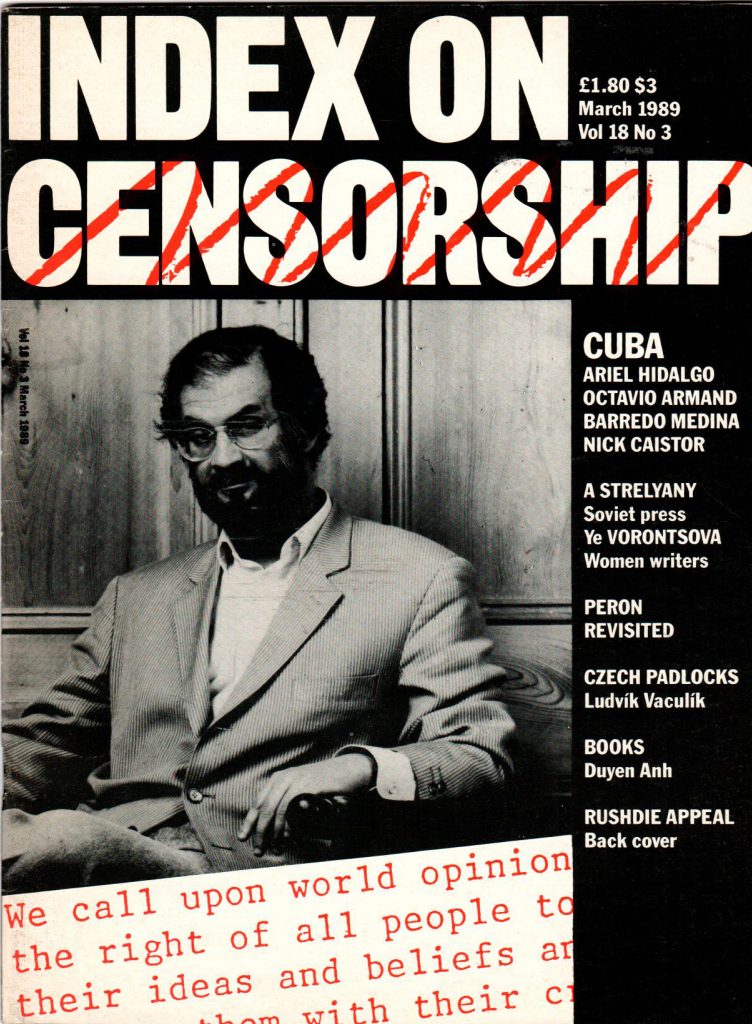
Cuba today, the March 1989 issue of Index on Censorship magazine.
World statement by the international committee for the defence of Salman Rushdie and his publishers
March 1989, vol. 18, issue 3
On 14 February the Ayatollah Khomeini called on all Muslims to seek out and execute Salman Rushdie, the author of The Satanic Verses, and all those involved in its publication. We, the undersigned, insofar as we defend the right to freedom of opinion and expression as embodied in the Universal Declaration of Human Rights, declare that we also are involved in the publication. We are involved whether we approve the contents of the book or not. Nonetheless, we appreciate the distress the book has aroused and deeply regret the loss of life associated with the ensuing conflict.

Islam & human rights, the May 1989 issue of Index on Censorship magazine.
Amir Taheri
May 1989, vol. 18, issue 5
‘What Rushdie has done, as far as Muslim intellectuals are concerned, is to put their backs to the wall and force them to make the choice they have tried to avoid for so long’. Last year, when poor old Mr Manavi filled in his Penguin order form for 10 copies of Salman Rushdie’s third novel, The Satanic Verses, he could not have imagined that the book, described by its publishers as a reflection on the agonies of exile, would provoke one of the most bizarre diplomatic incidents in recent times. Mr Manavi had been selling Penguin books in Tehran for years. He had learned which authors to regard as safe and which ones to avoid at all costs.

Islam & human rights, the May 1989 issue of Index on Censorship magazine.
Wole Soyinka
May 1989, vol. 18, issue 5
This statement is not, of course, addressed to the Ayatollah Khomeini who, except for a handful of fanatics, is easily diagnosed as a sick and dangerous man who has long forgotten the fundamental tenets of Islam. It is useful to address oneself, at this point, only to the real Islamic faithful who, in their hearts, recognise the awful truth about their erratic Imam and the threat he poses not only to the continuing acceptance of Islam among people of all religions and faiths but to the universal brotherhood of man, no matter the differing colorations of their piety. Will Salman Rushdie die? He shall not. But if he does, let the fanatic defenders of Khomeini’s brand of Islam understand this: The work for which he is now threatened will become a household icon within even the remnant lifetime of the Ayatollah. Writers, cineastes, dramatists will disseminate its contents in every known medium and in some new ones as yet unthought of.
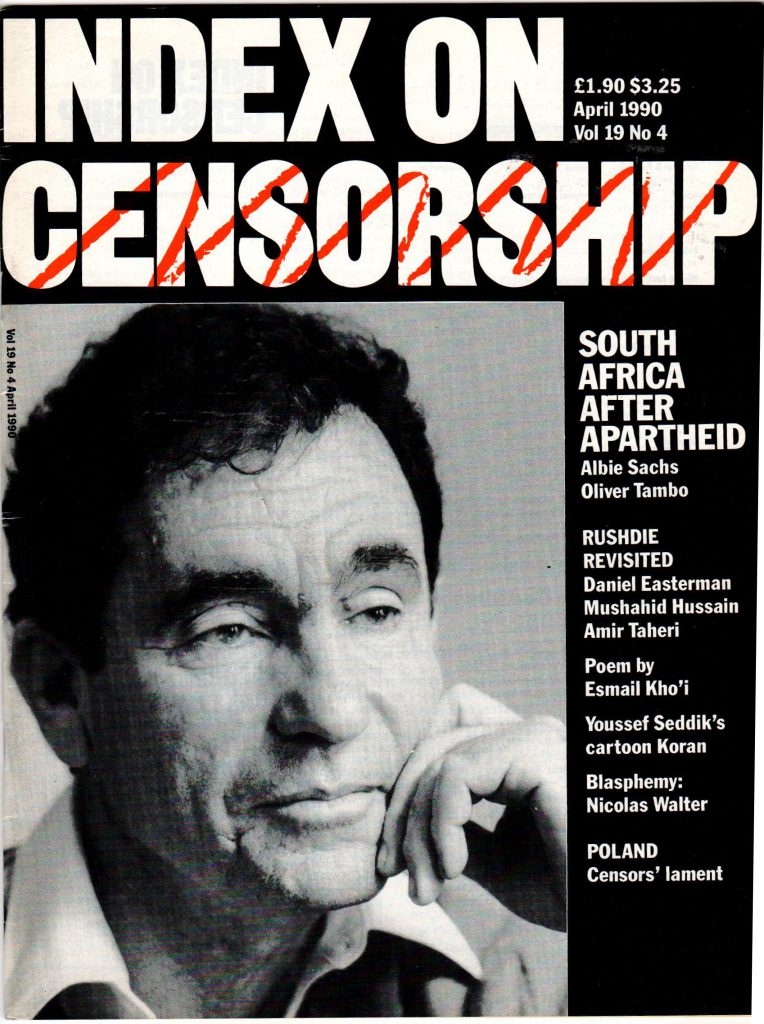
South Africa after Apartheid, the April 1990 issue of Index on Censorship magazine.
Reflections on an invalid fatwah
Amir Taheri
April 1990, vol. 19, issue 4
Broadly speaking, three predictions were made. The first was that Khomeini’s attempt at exporting terror might goad world public opinion into a keener understanding of Iran’s tragedy since the Islamic Revolution of 1979. The fact that the Ayatollah had executed thousands of people, including many writers and poets since his seizure of power in Tehran had provoked only mild rebuke from Western governments and public opinion. With the fatwa against Rushdie, we thought the whole world would mobilise against the ayatollah, turning his regime into an international pariah. Nothing of the kind happened, of course, and only one country, Britain, closed its embassy in Tehran – and that because the mullahs decided to sever.diplomatic ties. In the past twelve months Federal Germany and France have increased their trade with the Islamic Republic to the tune of II and 19 per cent respectively. The EEC countries and Japan have, in the meantime, provided the Islamic Republic with loans exceeding £2,000 million. The stream of European and Japanese businessmen and diplomats visiting Tehran turned into a mini-flood after Khomeini’s death last June.

South Africa after Apartheid, the April 1990 issue of Index on Censorship magazine.
Salman Rushdie and political expediency
Adel Darwish
April 1990, vol. 19, issue 4
When I reviewed Salman Rushdie’s Satanic Verses in September 1988, it never crossed my mind to make any reference to possible offence to Muslim readers, let alone to anticipate the unprecedented international crisis generated in the months that followed. I do not think I was naive – as an LBC radio reporter suggested when she interviewed me at the first public reading from The Satanic Verses in June 1989. On the contrary, I can claim more than many that I am able to understand what Mr Rushdie was trying to say in his book, and the way the crisis has developed. Like Mr Rushdie, I am a British writer, born to a Muslim family. Born in Egypt, I was educated and am employed in Britain, and have been preoccupied and engaged, mainly in the 1960s and 1970s, with the issues that Mr Rushdie has fought for and with which he seemed to be very much concerned in his book.
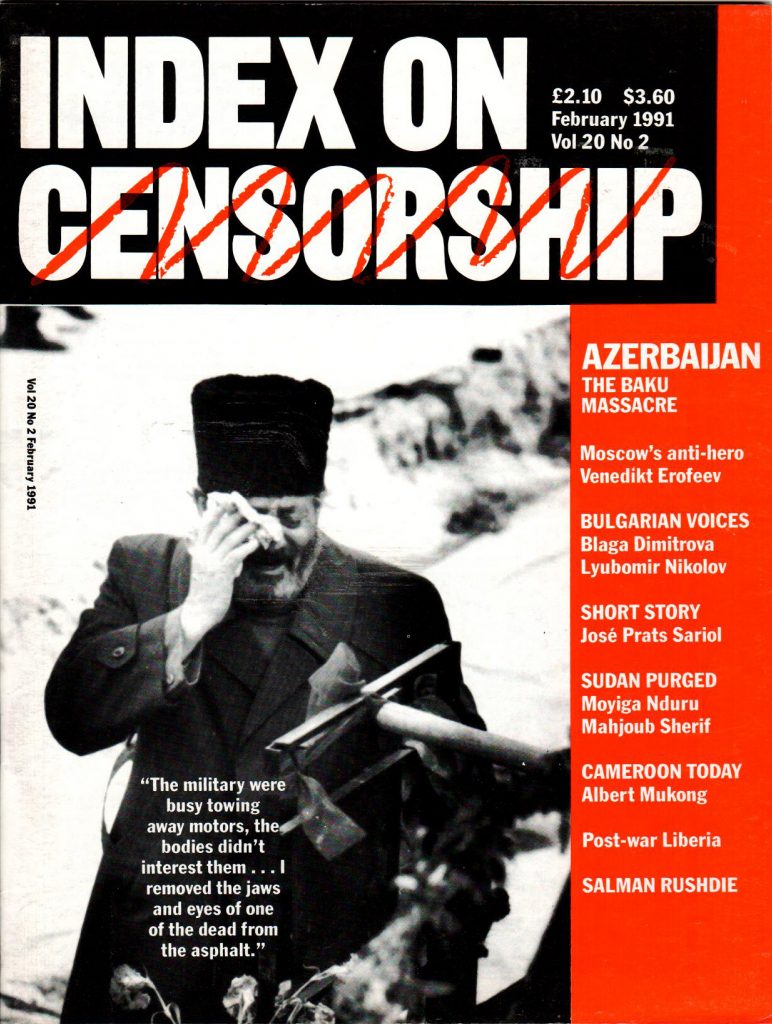
Azerbaijan, the February 1991 issue of Index on Censorship magazine.
Salman Rushdie
February 1991, vol. 20, issue 2
A man’s spiritual choices are a matter of conscience, arrived at after deep. reflection and in the privacy of his heart. They are not easy matters to speak of publicly. I should like, however, to say something about my decision to affirm the two central tenets of Islam — the oneness of God and the genuineness of the prophecy of the Prophet Muhammad —and thus to enter into the body of Islam after a lifetime spent outside it. Although I come from a Muslim family background, I was never brought up as a believer, and was raised in an atmosphere of what is broadly known as secular humanism. I still have the deepest respect for these principles. However, as I think anyone who studies my work will accept, I have been engaging more and more with religious belief, its importance and power, ever since my first novel used the Sufi poem Conference of the Birds by Farid ud-din Attar as a model. The Satanic Verses itself, with its portrait of the conflicts between the material and spiritual worlds, is a mirror of the conflict within myself.
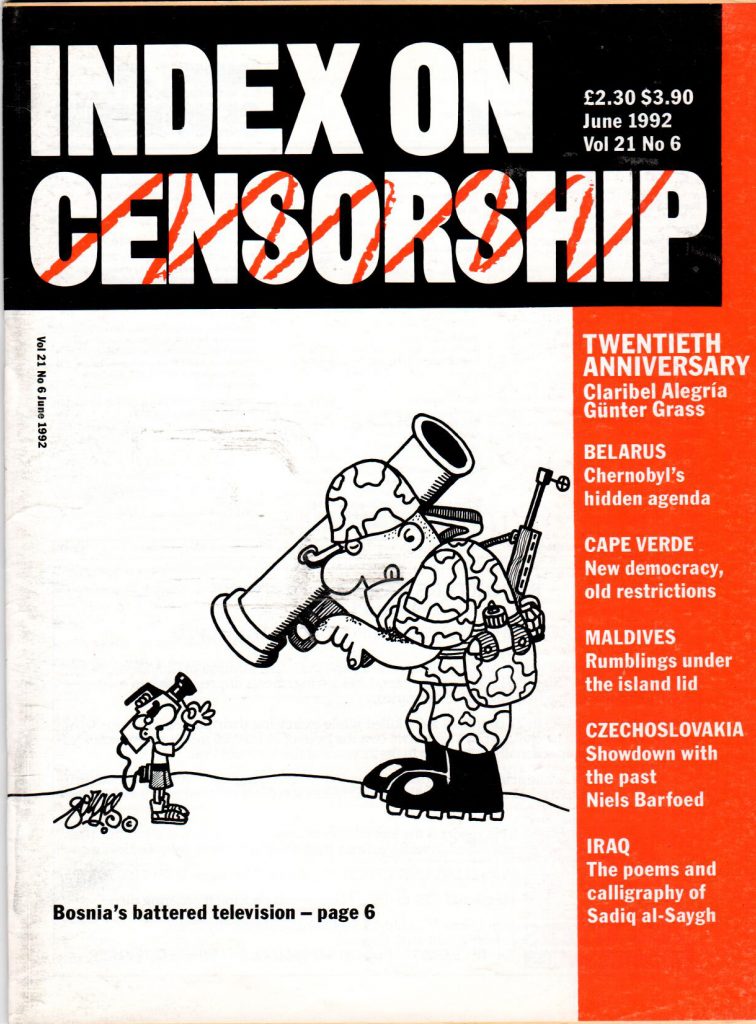
20th Anniversary: Reign of terror, the June 1992 issue of the Index on Censorship magazine.
Gunter Grass
June 1992, vol. 21, issue 6
When George Orwell returned from Spain in 1937, he brought with him the manuscript of Homage to Catalonia. It reflected the experiences he had gathered during the Civil War. At first, he was unable to find a publisher because a multitude of influential, left-wing intellectuals had no wish to acknowledge its shocking observations. They did not want to accept the Stalinist terror, the systematic liquidation of anarchists, Trotskyists and left-wing socialists. Orwell himself only narrowly escaped this terror. His stark accusations contradicted a world image of a flawless Soviet Union fighting against Fascism. Orwell’s report, this onslaught of terrible reality, tarnished the picture-book dream of Good and Evil. A year later, a bourgeois Western publisher brought out Homage to Catalonia; in the areas of Communist rule, Orwell’s works – among them the bitter Spanish truth – were banned for half a century. The minister responsible for state security= in the German Democratic Republic, right to its end, was Erich Mielke. During the Spanish Civil War, he was a member of the Communist cadre to whom purge through liquidation became commonplace. A fighter for Spain with an extraordinary capacity for survival.
Read the full article[/vc_column_text][/vc_column][/vc_row][vc_row][vc_column][vc_column_text]

Russia’s choice, the November-December 1993 issue of Index on Censorship magazine.
The Rushdie affair: Outrage in Oslo
Hakon Harket
November 1993, vol. 22, issue 10
The terrorist state of Iran must face the consequences of refusing to lift the fatwa that condemns Salman Rushdie, and those associated with his work, to death. When someone, in accordance with the express order of the fatwa, attempts to murder one of the damned, the obvious consequence is that Iran must be held responsible for the crime it has called for, at least until there is conclusive proof that no connection exists. The shooting of William Nygaard has reminded the Norwegian public of what the Rushdie affair is really about: life and death; the abuse of religion; the fiction of a free mind. This war of terror against freedom of speech is not one we can afford to lose. Since the nightmare clearly will not disappear of its own accord, it must be engaged head-on.

New censors, the March 1996 issue of Index on Censorship magazine.
March 1996, vol. 25, issue 2
This statement is not, of course, addressed to the Ayatollah Khomeini who, except for a handful of fanatics, is easily diagnosed as a sick and dangerous man who has long forgotten the fundamental tenets of Islam. It is useful to address oneself, at this point, only to the real Islamic faithful who, in their hearts, recognise the awful truth about their erratic Imam and the threat he poses not only to the continuing acceptance of Islam among people of all religions and faiths but to the universal brotherhood of man, no matter the differing colorations of their piety. Will Salman Rushdie die? He shall not. But if he does, let the fanatic defenders of Khomeini’s brand of Islam understand this: The work for which he is now threatened will become a household icon within even the remnant lifetime of the Ayatollah. Writers, cineastes, dramatists will disseminate its contents in every known medium and in some new ones as yet unthought of.
The Rushdie affair: Outrage in Oslo
Hakon Harket
November 1993, vol. 22, issue 10
The terrorist state of Iran must face the consequences of refusing to lift the fatwa that condemns Salman Rushdie, and those associated with his work, to death. When someone, in accordance with the express order of the fatwa, attempts to murder one of the damned, the obvious consequence is that Iran must be held responsible for the crime it has called for, at least until there is conclusive proof that no connection exists. The shooting of William Nygaard has reminded the Norwegian public of what the Rushdie affair is really about: life and death; the abuse of religion; the fiction of a free mind. This war of terror against freedom of speech is not one we can afford to lose. Since the nightmare clearly will not disappear of its own accord, it must be engaged head-on.

New censors, the March 1996 issue of Index on Censorship magazine.
March 1996, vol. 25, issue 2
This statement is not, of course, addressed to the Ayatollah Khomeini who, except for a handful of fanatics, is easily diagnosed as a sick and dangerous man who has long forgotten the fundamental tenets of Islam. It is useful to address oneself, at this point, only to the real Islamic faithful who, in their hearts, recognise the awful truth about their erratic Imam and the threat he poses not only to the continuing acceptance of Islam among people of all religions and faiths but to the universal brotherhood of man, no matter the differing colorations of their piety. Will Salman Rushdie die? He shall not. But if he does, let the fanatic defenders of Khomeini’s brand of Islam understand this: The work for which he is now threatened will become a household icon within even the remnant lifetime of the Ayatollah. Writers, cineastes, dramatists will disseminate its contents in every known medium and in some new ones as yet unthought of.

Tolerance and the intolerable, the May 1994 issue of Index on Censorship magazine
Salman Rushdie
May 1994, vol. 23, issue 1-2
When the Balkans War broke out, Rushdie had never been to Sarajevo, but felt that he belonged to it. He imagined a Sarajevo of the mind, whose ruination and torment exiled everyone.
He wrote: “Sarajevo’s truth is that its citizens, who reject definition by religion or confession, who wish to be simply Bosnians, have for their pains been labelled by the outside world as ‘Muslims’. It is instructive to imagine how things might have gone in former Yugoslavia if the Bosnians had been Christians and the Serbs had been Muslims, even Muslims ‘in name only’. Would Europe have supported a ‘Serbian Muslim’ carve-up of the defunct state? It’s only a guess, but I guess that it would not. Which being true, it must also be true that the ‘Muslim’ tag is part of the reason for Europe’s indifference to Sarajevo’s fate.”
Peter Mayer
December 2008, vol. 37, issue 4
As publisher of The Satanic Verses, Peter Mayer was on the front line. He writes here for the first time about an unprecedented crisis:
Penguin published Salman Rushdie’s The Satanic Verses six months before Ayatollah Khomeini issues his fatwa. When we decided to continue publishing the novel in the aftermath, extraordinary pressures were focused on our company, based on fears for the author’s life and for the lives of everyone at Penguin around the world. This extended from Penguin’s management to editorial, warehouse, transport, administrative staff, the personnel in our bookshops and many others. The long-term political implications of that early signal regarding free speech in culturally diverse societies were not yet apparent to many when the Ayatollah, speaking not only for Iran but, seemingly, for all of Islam, issued his religious proclaimation.
Bernard-Henri Lévy
December 2008, vol. 37, issue 4
As publisher of The Satanic Verses, Peter Mayer was on the front line. He writes here for the first time about an unprecedented crisis:
Salman Rushdie was not yet the great man of letters that he has since become. He and I are, though, pretty much the same age. We share a passion for India and Pakistan, as well as the uncommon privilege of having known and written about Zulfikar Ali Bhutto (Rushdie in Shame; I in Les Indes Rouges), the father of Benazir, former prime minister of Pakistan, executed ten years earlier in 1979 by General Zia. I had been watching from a distance, with infinite curiosity, the trajectory of this almost exact contemporary. One day, in February 1989, at the end of the afternoon, as I sat in a cafe in the South of France, in Saint Paul de Vence, with the French actor Yves Montand, sipping an orangeade, I heard the news: Ayatollah Khomeini, himself with only a few months to live, had just issued a fatwa, in which he condemned as an apostate the author of The Satanic Verses and invited all Muslims the world over to carry out the sentence, without delay.
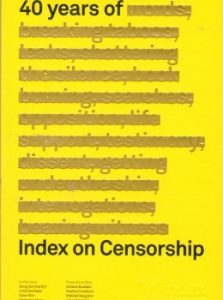
40 years of Index on Censorship March 2012
Salman Rushdie
March 2012, vol. 41, issue 1
Salman Rushdie’s first memories of censorship are cinematic: screen kisses brutalised by prudish scissors which chopped out the moments of actual contact. (Briefly, before comprehension dawned, he wondered if that were all there was to kissing, the languorous approach and then the sudden turkey-jerk away.) The effect was usually somewhat comic, and censorship still retains, in contemporary Pakistan, a strong element of comedy. When the Pakistani censors found that the movie El Cid ended with a dead Charlton Heston leading the Christians to victory over live Moslems, they nearly banned it until they had the idea of simply cutting out the entire climax, so that the film as screened showed El Cid mortally wounded. El Cid dying nobly, and then it ended. Muslims 1, Christians 0.
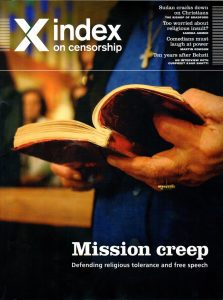
The winter 2013 issue of Index on Censorship magazine.
Defending the right to be offended
Samira Ahmed
December 2013, vol. 42, issue 4
The tensions between freedom of speech and religious belief remain acute – and they are systematically exploited by political groups of all stripes, from the English Defence League to radical Islamists who threaten to disrupt the repatriation of dead British soldiers at Wootton Bassett. The story consistently makes the headlines. The idea that there is an Islamist assault on British freedoms and values is widespread.
The Muslim campaign against Salman Rushdie’s The Satanic Verses in 1988 was the crucial moment in all this. It forced writers and artists from an Asian or Muslim background, whether they defined themselves that way or not, to take sides. They had to declare loyalty – or otherwise – to the offended.

